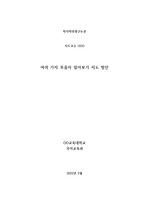

PARTNER
검증된 파트너 제휴사 자료
불규칙의 인지적 고찰과 학교 문법 (A Cognitive Exploration of Irregularity and School Grammar)
한국학술지에서 제공하는 국내 최고 수준의 학술 데이터베이스를 통해 다양한 논문과 학술지 정보를 만나보세요.
40 페이지
최초등록일 2025.02.11
최종저작일
2013.08

-
서지정보
· 발행기관 : 국어교육학회(since1969)
· 수록지 정보 : 국어교육연구 / 53호 / 229 ~ 268페이지
· 저자명 : 정병철
초록
School Grammar always has contained the irregularity of Korean verb conjugation as a learning subject, but the goal and value of the topic has not been clear and the appropriate method for this subject has not been discussed at all. This paper suggests that irregularities found in Korean can be properly explained by the Usage Based Model of Cognitive Grammar, and on this foundation we can find many valuable knowledges related to the problems and issues of conjugation in the context of School Grammar. From the perspective of Cognitive Grammar, the regular pattern has a great advantage in terms of entrenchment and ease of activation, but sometimes there is to be strong motivation to override this choice. We could identify some minor patterns in Korean to be motivated for avoiding ‘homonymic clash’, which means that irregularities always have specific historical origins. In Korean, it is probable that conjugations of regular verbs enjoy unit status through frequent uses, and the irregularity of verbs indicates that each of their conjugating forms has unit status. Owing to the content requirement, we can only posit schemas that are directly analogous to occurring expressions, and only the lower-level schemas are accessible for the sanction of new expression. Therefore we can explain why Korean irregular conjugations need to be learned as units, but not as the results of transformation or phonetic rules. On the foundation of this article's notes, it is suggested that irregularity has to be presented as a dynamic network that has major and minor rules, not as a list that is stable and full of meaningless stuffs that is forced to be memorized.영어초록
School Grammar always has contained the irregularity of Korean verb conjugation as a learning subject, but the goal and value of the topic has not been clear and the appropriate method for this subject has not been discussed at all. This paper suggests that irregularities found in Korean can be properly explained by the Usage Based Model of Cognitive Grammar, and on this foundation we can find many valuable knowledges related to the problems and issues of conjugation in the context of School Grammar. From the perspective of Cognitive Grammar, the regular pattern has a great advantage in terms of entrenchment and ease of activation, but sometimes there is to be strong motivation to override this choice. We could identify some minor patterns in Korean to be motivated for avoiding ‘homonymic clash’, which means that irregularities always have specific historical origins. In Korean, it is probable that conjugations of regular verbs enjoy unit status through frequent uses, and the irregularity of verbs indicates that each of their conjugating forms has unit status. Owing to the content requirement, we can only posit schemas that are directly analogous to occurring expressions, and only the lower-level schemas are accessible for the sanction of new expression. Therefore we can explain why Korean irregular conjugations need to be learned as units, but not as the results of transformation or phonetic rules. On the foundation of this article's notes, it is suggested that irregularity has to be presented as a dynamic network that has major and minor rules, not as a list that is stable and full of meaningless stuffs that is forced to be memorized.참고자료
· 없음태그
-
자주묻는질문의 답변을 확인해 주세요

꼭 알아주세요
-
자료의 정보 및 내용의 진실성에 대하여 해피캠퍼스는 보증하지 않으며, 해당 정보 및 게시물 저작권과 기타 법적 책임은 자료 등록자에게 있습니다.
자료 및 게시물 내용의 불법적 이용, 무단 전재∙배포는 금지되어 있습니다.
저작권침해, 명예훼손 등 분쟁 요소 발견 시 고객센터의 저작권침해 신고센터를 이용해 주시기 바랍니다. -
해피캠퍼스는 구매자와 판매자 모두가 만족하는 서비스가 되도록 노력하고 있으며, 아래의 4가지 자료환불 조건을 꼭 확인해주시기 바랍니다.
파일오류 중복자료 저작권 없음 설명과 실제 내용 불일치 파일의 다운로드가 제대로 되지 않거나 파일형식에 맞는 프로그램으로 정상 작동하지 않는 경우 다른 자료와 70% 이상 내용이 일치하는 경우 (중복임을 확인할 수 있는 근거 필요함) 인터넷의 다른 사이트, 연구기관, 학교, 서적 등의 자료를 도용한 경우 자료의 설명과 실제 자료의 내용이 일치하지 않는 경우
“국어교육연구”의 다른 논문도 확인해 보세요!
-
문법 지식을 활용한 시 감상 방법 연구 - 문학과 문법의 통합과 관련하여 - 40 페이지
The lastly revised Korean language curriculum has focused on the trend to the integrated curriculum. However, the integrated curriculum between literature and grammar is relatively little concerned. T.. -
<원형의 전설>의 신화성 고찰 26 페이지
This article has figured out the three points of mythology shown in <The legend of a circle>, a full-length novel by Jang Yong-Hak. First of all, the mythological protagonist and also the head of the .. -
해방직후 조선문학가동맹의 매체투쟁과 미디어 전략 32 페이지
So far, The studies about organization or ideology of ‘The Union of Chosun Literary Men' have been done by the efforts of many researchers. However, political ideology-driven study has brought about t.. -
최인훈 문학의 재현 방식 연구- 『회색인』과 『서유기』를 중심으로 - 28 페이지
The real is such a world that have to expose and it is the world that have been taboo for Choi In-hoon. He defined the modernity as ‘the idea of negation'. Such idea of negation is located in his lite.. -
희곡교육에서의 미적 환영과 창의적 읽기- 함세덕의 희곡 <동승>을 메타연극으로 체험하기 - 32 페이지
With respect to deviations of children and adolescents, Literature to find the role of education analysis <The little Monk>(premiered and published 1939) and to propose alternatives. Play in this conf..
찾으시던 자료가 아닌가요?
지금 보는 자료와 연관되어 있어요!
문서 초안을 생성해주는 EasyAI


